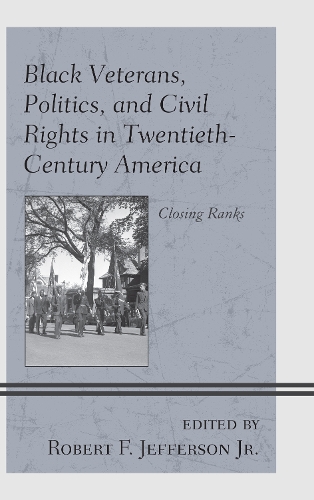
Black Veterans, Politics, and Civil Rights in Twentieth-Century America: Closing Ranks
(Hardback)
Publishing Details
Black Veterans, Politics, and Civil Rights in Twentieth-Century America: Closing Ranks
By (Author) Robert F. Jefferson
Contributions by Robert F. Jefferson
Contributions by Hal M. Friedman
Contributions by Kevin Greene
Contributions by Selika M. Ducksworth-Lawton
Contributions by Jeremy P. Maxwell
Contributions by Elizabeth F. Desnoyers-Colas
Contributions by Peter Karsten
Bloomsbury Publishing PLC
Lexington Books
29th January 2019
United States
Classifications
Professional and Scholarly
Non Fiction
362.8608996073
Physical Properties
Hardback
146
Width 159mm, Height 230mm, Spine 17mm
354g
Description
Fusing riveting testimony from African American veterans with the most incisive research of current military scholars, Black Veterans, Politics, and Civil Rights in 20th-Century America: Closing Ranks explores the intersecting characteristics of civil rights struggle and political activism that was reflected in the lives of ex-GIs throughout Twentieth Century American history. The volume examines black veterans social and political activities throughout the 20th Century, from the World Wars, through the Korean and Vietnam War, and ends with the Persian Gulf War. Presenting the full flesh and blood experiences of black veterans who came from backgrounds and from all walks of life, each essay captures how race, gender, ethnic, class, disability, generation, and region shaped their experiences in the nations military during times of war and how these issues profoundly affected the postwar politics they embraced while trying to realize the true meaning of equality in America. With original essays by emerging scholars in the field of study, Closing Ranks is a foundational text for reassessing the relationship between the ex-GI and the modern nation state and providing readers with a vivid window into the harsh realities that black citizen-soldiers have faced during war and its aftermath for nearly a century.
Reviews
Robert F. Jefferson Jr.s Black Veterans, Politics, and Civil Rights in Twentieth-Century America: Closing Ranks is a crucial contribution to a more nuanced understanding of the dynamic, contested, and sometimes uneven relationship between military service and civil rights. In this fine volume, Jefferson assembles an impressive collection of insightful essays by a diverse range of accomplished scholars. The result is a concise and cogent analysis of how black veterans have grappled with their military service and leveraged it in the broader struggle for civil rights. This noteworthy anthology should be required reading for anyone seeking to understand the vital linkages between military service, black veterans, and civil rights in American society during the twentieth century. Students, scholars, and general readers alike will benefit from reading it. -- William A. Taylor, Angelo State University
Author Bio
Robert F. Jefferson Jr. is associate professor of history at the University of New Mexico.
